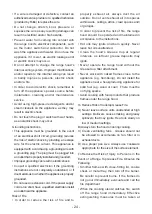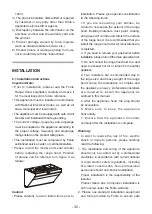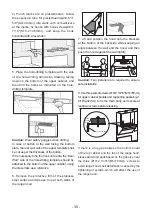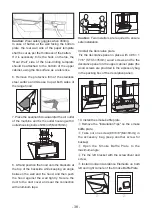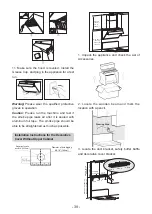
- 24 -
• If a wire is damaged or defective, contact an
authorized service provider or a qualified technician
(provided by Fotile) to replace the wire.
• Do not change, stretch, knot, pressure or
squeeze the wire as any resulting damage can
result in electrical and/or fire hazards.
• Prevent water from coming into contact with
the range hood’s electrical components, such
as the motor, switch and connector. Do not
wash the appliance with water. Do not use the
appliance if it is wet, as electric leakage and/
or electric shock may occur.
• Do not attempt to change the range hood’s
internal wiring system. Improper modifications
and/or repairs to the internal wiring can result
in bodily injuries to persons, electric shock
and/or a fire.
• In order to avoid electric shock, remember to
turn off the appliance’s power source before
installation, cleaning and/or maintenance
service.
• Avoid using high-pressure detergents and/or
steam cleaners on the appliance, as they may
result in electric shock.
• Do not touch the plug or switch with wet hands,
as an electric shock may occur.
Grounding Instructions
• This appliance must be grounded. In the event
of an electrical short circuit, grounding reduces
the risk of electric shock by providing an escape
wire for the electric current. This appliance is
equipped with a cord having a grounding wire with
a grounding plug. The plug must be plugged into
an outlet that is properly installed and grounded.
• Improper grounding can result in electric shock.
• Consult a qualified electrician if the grounding
instructions are not completely understood, or if
doubt exists as to whether the appliance is properly
grounded.
• Do not use an extension cord. If the power supply
cord is too short, have a qualified electrician install
an outlet near the appliance.
Risk of Fire
• In order to reduce the risk of fire and to
properly exhaust air, always duct the air
outside. Do not vent exhaust air into spaces
within walls, ceilings, attics, crawl spaces and/
or garages.
• In order to prevent the risk of fire, the range
hood should be operated and maintained in
accordance to the instructions.
• Hot oils may ignite and burn quickly. Never
leave hot oils unattended.
• Clean the hood’s Grease Cup at regular
intervals, as leftover grease deposits may
ignite.
• Never operate the range hood without the
Grease Cup filter attachment.
• Never work with naked flames close to the
appliance (e.g. flambéing). Do not install the
appliance near a heat-producing appliance for
solid fuel (e.g. wood or coal) .There must be
no flying sparks.
• Avoid cooking with food products that produce
flames under the range hood.
To Reduce Risk of Cooktop Grease Fire:
A) Never leave surface units unattended at high
settings. Boilovers cause smoking and greasy
spillovers that may ignite. Heat oils slowly on
low or medium settings.
B) Always turn the hood on during cooking.
C) Clean ventilating fans . Grease should not
be allowed to accumulate on fan, filter or in
exhaust ducts.
D) Use proper pan size. Always use cookware
appropriate for the size of the surface element.
To Reduce the Risk of Injury to Persons in the
Event of a Range Top Grease Fire, Observe the
Following:
• Smother flames with close-fitting lid, cookie
sheet, or metal tray, then turn off the burner.
Be careful to prevent burns. If the flames do
not go out immediately, evacuate and call the
fire department.
• When the cooking utensil catches fire, switch
off the range hood immediately. Effective
extinguishing measures must be taken at






